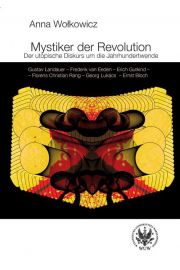Za ten produkt można zapłacić wyłącznie za pomocą płatności elektronicznych.

Mistyczny dyskurs rewolucji współtworzyli na przełomie XIX i XX wieku intelektualiści różnych opcji światopoglądowych i politycznych, od wyznawcy etycznego anarchizmu Gustava Landauera po uczonego-ezoteryka Ericha Gutkinda i pruskiego konserwatystę Florensa Christiana Ranga. Niniejsza praca jest próbą jego rekonstrukcji na podstawie tekstów niejednokrotnie trudno dostępnych i rzadko interpretowanych, jak np. dokumenty programowe tzw. kręgu z Forte – proklamowanej w przeddzień I wojny światowej utopijnej wspólnoty duchowych przywódców ludzkości. W poszukiwaniu remedium na alienację i poczucie bezsensu omawiani autorzy sięgają nie tylko do Nietzschego i najnowszej literatury pięknej, lecz również do mistyki żydowskiej i pism Mistrza Eckharta, proponując jako alternatywę wobec pokantowskiej filozofii i naukowej wizji świata "mistyczny" model poznania jako czynu. Do jego przesłanek należą: kwestionowanie języka "obiektywnych" znaczeń i pojęć w imię zasady performatywności, mesjańska dekonstrukcja ("ofiara") podmiotu poznawczego i etycznego, antyhistorystyczna filozofia dziejów, akcentująca ich nieciągłość i wymiar egzystencjalny, oraz epifaniczna hermeneutyka zmetaforyzowanej rzeczywistości. Bezpośrednie nawiązania do tych wątków można znaleźć zarówno w koncepcji "rewolucji konserwatywnej" w ujęciu Hugo von Hofmannsthala, jak też u filozofów związanych z lewicą – György Lukácsa, Ernsta Blocha i Waltera Benjamina. Praca w języku niemieckim. A mystical revolutionary discourse was created at the turn of the 19th and 20th centuries by intellectuals representing various worldviews and political beliefs – from the ethical anarchism of Gustav Landauer through the scholarly esotericism of Erich Gutkind and the Prussian conservativism of Florens Christian Range. This book is an attempt to reconstruct this discourse on the basis of texts which in many cases are not widely available and are rarely discussed, as for example, the writings of a group known as the Forte Circle – a utopian community of spiritual leaders of humanity proclaimed on the eve of the First World War. In seeking a remedy for alienation and a sense of meaninglessness the authors discussed in the book turn not only to Nietzsche and contemporary literature, but also to Jewish mysticism and the writings of Meister Eckhart, and they propose as an alternative to Postkantian philosophy and a scientific vision of the world the “mystical” model of knowledge as act. Among its propositions are: the questioning of the language of “objective” meanings and concepts in the name of the principle of performatism, the messianic deconstruction (“sacrifice”) of the cognitive and ethical subject, an antihistorical theory of history – stressing its discontinuity and existential dimension, and the epiphanic hermeneutic of metaphorized reality. Direct references to these themes can be found both in the concept of “conservative revolution” propounded by Hugo von Hofmannsthal and in various philosophers associated with the left - György Lukács, Ernst Bloch and Walter Benjamin. The book is in German.




 Der Wettflug der Nationen
Der Wettflug der Nationen
 Der Brand der Cheopspyramide
Der Brand der Cheopspyramide
 The Angel of the Revolution
The Angel of the Revolution
 Teoria i praktyka mechanicznej wentylacji płuc w dobie COVID-19. Ebook
Teoria i praktyka mechanicznej wentylacji płuc w dobie COVID-19. Ebook
 Leki w ZRM typu P. Ebook
Leki w ZRM typu P. Ebook
 Immanuel Kant und die kopernikanische Wende in der Philosophie
Immanuel Kant und die kopernikanische Wende in der Philosophie
 Die Macht der Drei
Die Macht der Drei
 Das Erbe der Uraniden
Das Erbe der Uraniden
 John Workmann, der Zeitungsboy
John Workmann, der Zeitungsboy